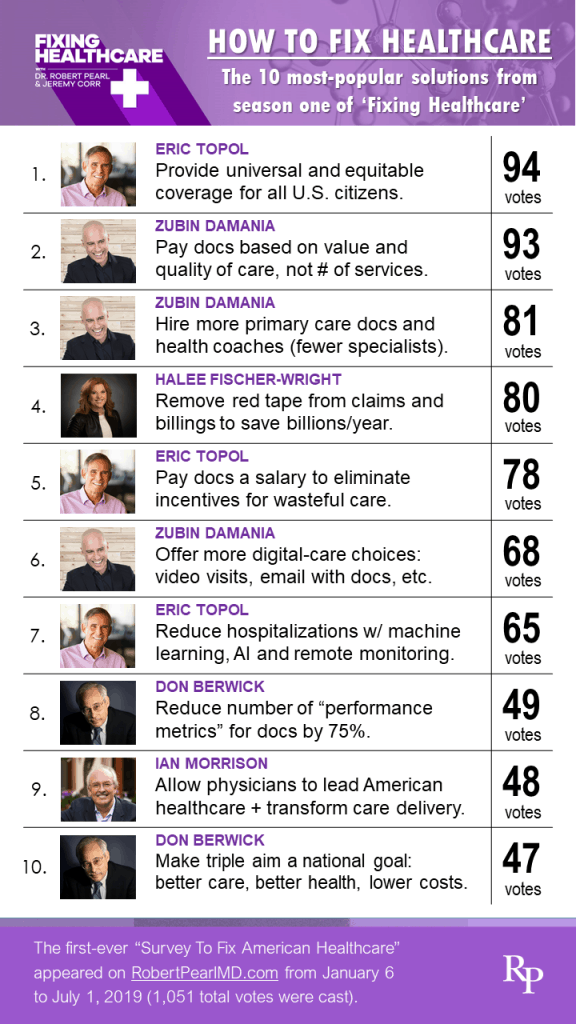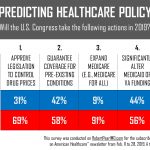Welcome to the Fixing Healthcare survey.
If you’re looking for the results of the inaugural survey (from January 2019), click here or check out the Season One survey results in this cool infographic:

If you’re here to take the NEW survey (which launched in August 2019), here’s what you need to know:
Soon, you’ll be asked to vote for the best ideas presented during season two of the Fixing Healthcare podcast. A summary of each guest’s ideas appeared in a recently released “bonus episode” of Fixing Healthcare. The solutions presented in this survey have been condensed for formatting purposes. Voters are urge to listen to the entire episode before voting.
The purpose of this survey is to find out which solutions will result in significant improvements for American Healthcare in the future.
*This survey is no longer active. For results of the 2021 Fixing Healthcare survey, click here.
* * *
Dr. Robert Pearl is the former CEO of The Permanente Medical Group, the nation’s largest physician group. He’s the bestselling author of “Mistreated: Why We Think We’re Getting Good Health Care–And Why We’re Usually Wrong” and a Stanford University professor. Follow him on Twitter @RobertPearlMD.
-
[…] Click here to view the ‘Fixing Healthcare’ poll […]
[…] Click here to view the ‘Fixing Healthcare’ poll […]
[…] Click here to view the ‘Fixing Healthcare’ poll […]
[…] Click here to view the ‘Fixing Healthcare’ poll […]
[…] you’ve read them, please check out the Fixing Healthcare Survey and vote for the solutions you believe will be most […]
[…] January 2019, the Survey To Fix American Healthcare asked listeners to weigh in on the best solutions from Season One. Nearly one-thousand votes have […]







Health insurance does Not equal actual, functional Health Care, as so many of us have discovered. We need to move away from a model that requires anything more than catastrophic coverage, and coverage for the very poor, but still allows affordable access AND allows for real care, instead of the 15 minutes of insurance-mandated malpractice that currently functions as the standard.
This will seem impractical to most, but I sincerely believe that if we could get the government COMPLETELY out of the healthcare industry there would be a medical care renaissance in the USA that would become a beacon to all the nations on earth. What we have now is an almost complete thwarting of what sometimes makes American industry so productive.
1. Regarding suggestion #12: Reduce incentives for doctors to order unnecessary tests. In order for this to be successful, there must be more reasonable regulations around malpractice and the litigious environment within which physicians practice. I would argue that much of the “unnecessary testing” done by physicians is caused not by their desire to profit directly, but by their inherent worry about being sued, the extremely high and sometimes unrealistic expectations from patients seeking care in the US, and the limited amount of time physicians are able to spend with patients these days because of declining reimbursements – it takes far more time to develop a trusting relationship with patients and discuss why certain tests are unnecessary than to simply order the tests patients desire.
2. Regarding the idea to focus more on prevention in primary care: I cannot agree with this more. However, focusing on prevention takes a commitment of time and resources, without the expectation of recouping resources for many years. For example, healthy adults start with healthy children. Yet pediatric obesity and is an epidemic with minimal funding or attention on spreading best practices – because it takes time and money with no obvious immediate results. Another example is the opioid epidemic. We are focusing on legislation and controlling physician prescribing practices rather than the underlying problem. What about focusing instead on expanding our mental health services so that patients receive treatment for the underlying problems in childhood and early adulthood before they turn to drugs for self-medication. Again, this requires tremendous resources upfront without any hope of results over many years.
We can save up to 15% of more of the cost of healthcare without cutting benefits or services by reducing administrative costs with secure online records, benefits and payments for healthcare. This will improve the quality of care, satisfaction with care and access to care. Couple this with healthcare for all and we will have even more benefits. Other countries have done this, generally with universal coverage with proven results. With healthcare now approaching 19% of GDP, a 15 % reduction in healthcare will be like a 2.5% stimulus to the economy, also making us more competitive in the world market. This is technology that is available and would leverage on the progress already made with electronic health records and regional health information systems. Additional details and references are on the website http://www.healthcare-savings.com.
I believe that medical education, using the scientific biomedical model without the principles of what it means to be a compassionate healer, is one of the primary failures in health care over the past 50 years. Study after study supports that outcomes are better,compliance higher, utilization and litagation lower when there is an effort to care for the person recognizing they are not just a disease or biomechanical problem. Yes, it takes more time but the outcome will both give better care, but more efficient effective care. I think this is what Dr. Atul Gawande is trying to communicate to the medical community. I have first hand experience in changing practice patterns, reducing utilization with modeling these principles in a moderately sized ER with a large geriatric population. We decreased 30 day readmission rates, ICU mortality of those over 85, decreased in hospital deaths, and medical staff encouraged and happier overall as we made sure the goals of care matched the treatment plan.